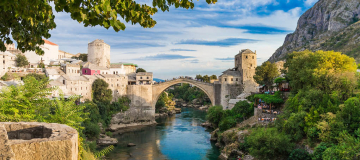
The Conflict in Bosnia-Herzegovina 30 Years Later. A Legal and Historical Reflection
Aula Nievo , Palazzo Bo | Webinar
Dal 24.03.2022 al 25.03.2022
24 - 25 March 2022
AULA I. NIEVO, PALAZZO BO
via VIII Febbraio 2, Padova
Click here to register for the webinar
The conflict that devastated Bosnia and Herzegovina exactly thirty years ago was the scene of large-scale war crimes, raised delicate legal questions, and constituted an important moment in the evolution of post-Cold War international relations, so much so as to raise the question of whether the crisis that affected the Balkan area in 1992-5 can be considered, together with the Gulf War, as the origin of post-bipolar (dis)order, certainly in Europe, perhaps on a global level. The conference aims at offering a critical reflection on the most relevant aspects of the conflict as well as an assessment of the post-war period, both from the point of view of international relations and international law.
The first session focusses on fundamental aspects of the conflict and in particular its epilogue with the massive military involvement of NATO in Bosnia and Herzegovina. The intervention will be analysed from two perspectives: on the one hand, its legal basis and the memorandum of understanding concluded between NATO and the United Nations peacekeeping force (UNPROFOR); on the other hand, the setting aside of the United Nations Security Council, a circumstance that was repeated on the occasion of the interventions in Kosovo (1999) and Iraq (2003).
The second session deals with the period after the end of hostilities, formalised in 1995 with the Dayton Accords. These agreements provided for a complex architecture for Bosnia and Herzegovina. The session attempts to assess the management of the post-conflict period, with particular attention to the functioning of the state and the implementation of measures aimed at the coexistence of the different nationalities and minorities present on its territory. The final objective of the session is to identify not only the problems that emerged in the post-war period, but also - and above all - the instruments that worked and could be reproduced elsewhere, as well as the legacies of the Bosnian crisis from the standpoint of European and global politics of the 21st century.





